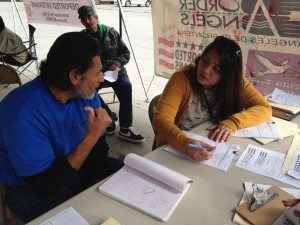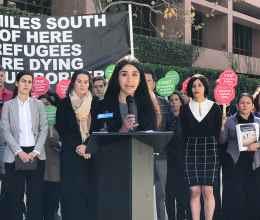By Lida Dianti
To some U.S. veterans, the tragedy of war is more than the violence or conflict on the ground. It is a shadow that follows them home in the form of unemployment, PTSD and substance abuse. Non-citizen veterans—despite spending years of their lives defending this country—must not only unpack shell shock but also face the threat of deportation.
Though they are promised naturalization, far too many U.S. military veterans, who are generally green card holders, never actually naturalize and are subject to deportation if they pick up a criminal conviction when they return home, even if it is just for a misdemeanor offense. Thousands of immigrants have served to uphold the systems that protect the American people only to be vilified by the same institutions they risked their lives to defend.
Many deported veterans contend that military recruiters mislead them to enlist, telling them that they would become a U.S. citizen by virtue of joining the military. As a result, immigrants often are completely unaware that they can be deported even with their veteran status.
Margaret Stock of Cascadia Cross-Border Law in Anchorage, Alaska, who has represented deported servicemen, expressed a common misconception among immigrant veterans.
"They raised their right hands and swore to defend the Constitution," Stock told the Los Angeles Times. "They thought that made them citizens."
Other veterans say that they in fact filed their naturalization paperwork while they were in the military, but the federal government lost the paperwork or never responded. Still others say that the military could have helped them naturalize during basic training, but failed to do so. The Pentagon reports that since 2009, about 9,800 men and women have earned their citizenship during basic military training. More than 89,000 people have received citizenship through military service since 9/11.
It is important to note that naturalization after deployment has long been a benefit provided to servicemen. As early as the Civil War, immigrants have played a pivotal role in the U.S. military. One in six troopers in George Custer’s 7th Cavalry at the Battle of the Little Big Horn was an Irish immigrant. The promise of U.S. citizenship after military service has been a long-standing practice that provided immigrants with a highly valued avenue to naturalization. The history of military service in America would be significantly different without the inclusion of immigrants and the promise of citizenship that followed.
In recent years, as veterans return from Iraq and Afghanistan, they find adjusting to civilian life to be difficult. Many of them struggle with PTSD and substance abuse as they work to regain a sense of the lives they led before suffering the trauma of war.
The ACLU of California is partnering with Deported Veterans Support House, a shelter and resource center for deported veterans based in Tijuana, Mexico, on a project to end the unjust deportations of U.S. military veterans. Although a 2011 Immigrations and Customs Enforcement (ICE) memo provides veterans special consideration in deportation hearings, more often than not, this consideration is ignored or applied inconsistently.
Since January, the ACLU of California has documented 70 cases of veterans deported to countries around the world, and is evaluating each case for possible avenues for legal relief to enable these veterans to come home.
“For these men, their deportation is like a life sentence – it means permanent separation from their families, their lives, their livelihoods, and the only country that most of them have ever known,” said Jennie Pasquarella, attorney and immigrants’ rights director for the ACLU of California. “They honorably served our country, and they also served their time in the criminal justice system. They should not serve a life of exile as well. It’s time for the United States to bring them home.”
Currently, the ACLU is representing Daniel Torres in his quest to become a U.S. citizen. Torres is a former Marine who served in Iraq and is now living in Tijuana. When Torres enlisted, he took an oath “to support and uphold” the Constitution and defend the only country he called home. He certainly was “American” enough to serve in Iraq. But what he possessed in tenacity, military prowess and leadership, he lacked in legal immigration status.
"We feel like Americans that have been banished, in exile from the country we love the most," Torres told NPR.








